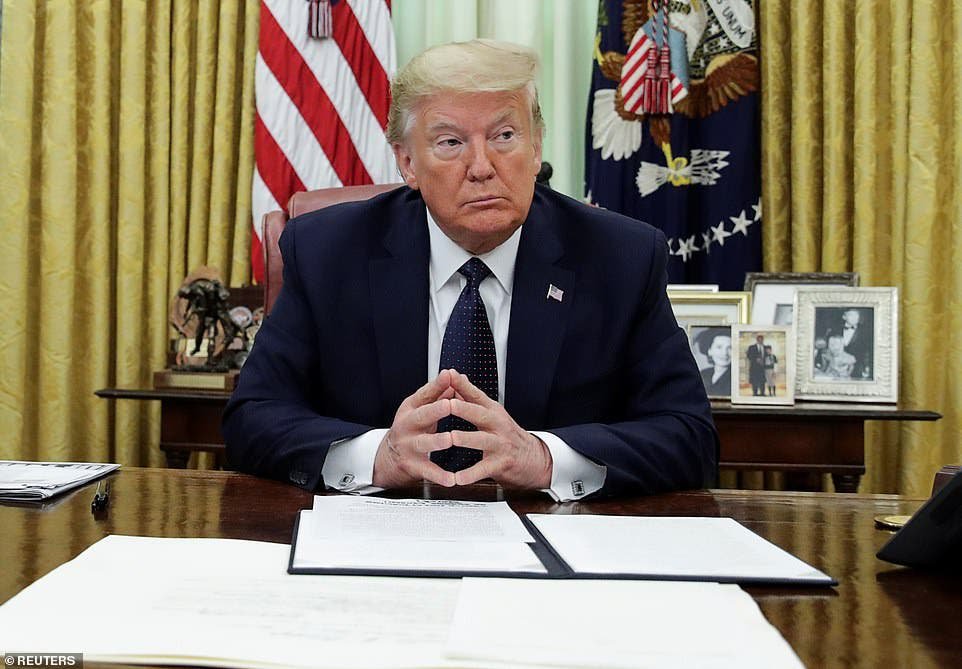News
Trump signs executive order against ‘anti-conservative bias’ on social media
President Donald Trump lashed out at social media Thursday accusing it of anti-conservative bias which he called one of the greatest threats to free speech in American history – and said he wished he could close down Twitter.
He lambasted the platform as he signed an executive order in the Oval Office which is intended to begin tackling what he claims is censorship of conservative voices.

The order could open Twitter, Facebook and Google up to lawsuits by diluting the legal protection which stops them from being liable for posts on their platforms, and which also allows them to moderate content.
It came after Twitter slapped two of the President’s tweets with a ‘fact check’ on Tuesday and Trump hit back by saying he would regulate and even shut down the Silicon Valley giants if they are shown to be biased.
He accused Twitter of becoming an ‘editor with a point of view’ and not a ‘neutral platform’ by fact-checking him and then slammed one of its executives, Yoel Roth, its head of user integrity, accusing him of ‘fraud’ for the fact check. Twitter says he was not involved in it.
Asked if he wanted to get rid of Twitter he said: ‘If it was legal, if it was able to be legally shut down, I would.’
Trump signed the executive order on ‘fairness’ which could lead to Twitter, Facebook, Google and other social media and search platforms being stripped of a legal shield which makes them almost immune from being sued.
Trump rolled out the tough language as Attorney General Bill Barr looked on and the president signed an order that could expose Twitter and other social media platforms to a barrage of lawsuits. Barr said when firms ‘curate’ their collection and engage in ‘censoring’ content firms become ‘publishers’ and shouldn’t be entitled to a legal ‘shield.’
‘We’re here today to defend free speech from one of the greatest dangers it has faced in American history, frankly, and you know what’s going on as well as anybody. It’s not good,’ Trump said before inking the order, which came just days after Twitter for the first time provided what Trump’s staff calls a fact-check on his own tweets.
Pressed on whether he would in fact seek to use the courts to shut down Twitter, Trump responded: ‘I think this: if twitter were not honorable, if you’re going to have a guy like this be your judge and jury I think you shut it down as far as I’m concerned,’ in reference to Twitter’s ‘head of integrity,’ who has been revealed to have posted tweets highly critical of Trump and top Republicans.
Trump, a billionaire who amassed a branding and real estate empire before running for president, added: ‘A small handful of powerful social media monopolies controls a vast portion of all public and private communication in the United States and we know what they are, we don’t have to name them, we’re going to give you a complete listing.’
He continued: ‘They’ve had unchecked power to censure, restrict, edit, shape, hide, alter virtually any form of communication between private citizens or large public audiences.’
Trump brought up the 2016 elections as he tore into Twitter – a fact lawyers might try to flag if companies try to claim in court the action is politically motivated.
‘We can’t allow that to happen especially when they go about doing what they’re doing,’ Trump said. ‘Because they’re doing things incorrectly. They have points of view. And if we go by that it’s actually amazing that there was a success in 2016, but we can’t let this continue to happen. It’s very, very unfair.’
‘What they’re doing is tantamount to monopoly you can say,’ Trump claimed. It’s tantamount to taking over the airwaves. Can’t let it happen. Otherwise, we’re not going to have a democracy. We’re not going to have anything to do with a republic.’
Trump also tried to use the power of federal purse strings as pressure, saying we ‘are not going in any social media company that repress[es] free speech.’
He said the government spends ‘billions of dollars on giving them money’ and called the firms ‘rich enough,’ although independent accounts put the total government ad spending far lower.
‘We’re going to be doing none of it or very little of it,’ Trump said.
Asked if he would consider simply deleting his Twitter account given his concerns, Trump said he would ‘do that in a heartbeat’ if we had a ‘fair press’ in the U.S.
A leaked draft of the document suggests that it will try to limit the crucial protection social media companies have from being sued under normal defamation and free speech laws, although it falls short of his threat to ‘close’ platforms.
Shares in Twitter, the target of Trump’s anger for the fact check, were down 3% by early afternoon, but those in Facebook rose slightly.
Its founder Mark Zuckerberg told CNBC he did not want to be an ‘arbiter of truth,’ and criticized Twitter’s Jack Dorsey for the fact-checks. Google share were also up. It has not passed comment on the row.
The draft version of the order shows that Trump will order the Federal Communications Commission (FCC) to clarify how to enforce regulations under Section 230 of the Communications Decency Act.
That is the federal law largely exempting online platforms from legal liability for users’ posts.
But the draft order says that the protection should not apply if companies are ‘engaged in editorial conduct’ – meaning making a judgment for themselves about how people’s points of view are presented.
That is what Trump accuses Twitter of doing by fact-checking him, and what conservatives claim happens to their posts which are promoted less than those with more liberal viewpoints.
Such a move could open up Twitter, Facebook and other platforms to an avalanche of lawsuits from people claiming their views have been unfairly censored.
It also requires the agency to look at whether social media platforms are using ‘deceptive’ policies to moderate content by not openly declaring how they decide how viewpoints are dealt with.
Trump is also expected to set up a mechanism allowing Americans to report alleged political censorship or bias by the social media giants which will be investigated by the Federal Trade Commission.
The White House tech bias reporting tool will collect complaints of online censorship and submit them to the Department of Justice and the Federal Trade Commission (FTC).
The FTC will then be required to ‘consider taking action’, examine whether complaints violate the law, draw up a report describing such complaints and make the report publicly available.
Source: Daily Mail
-

 Celebrity Gossip & Gist1 day ago
Celebrity Gossip & Gist1 day ago“Why It’s a sin to marry only one or two wives” – Nollywood actor, Uwaezuoke advises men
-

 News1 day ago
News1 day agoINEC Speaks On Manipulating Edo Governorship Election
-

 News1 day ago
News1 day agoCouple reportedly uses doll baby to stand in for their daughter during celebration
-

 Lifestyle1 day ago
Lifestyle1 day ago“Them carry their beef enter Live TV” – Reactions as two female presenters drag with each other during a live broadcast, clip goes viral (Watch)





